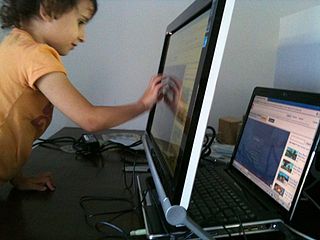A recent study by pediatricians from the Cohen Children’s Medical Center of New York examined infants 0-3 years old that used touch-screen devices to determine if their use was of any educational benefit to infants and toddlers. The study showed that children who played non-educational games using touch-screen devices had lower verbal scores upon testing.
The results also showed that although the majority of parents cited in the study believed their children received educational benefits by using smart phones, readers and tablets, there was no statistical difference in developmental scores in children who played educational games versus non-educational games.
“We have observed in our neonatal clinic that the number one “toy” parents are giving their toddlers are smart phones,” said Ruth Milanaik, DO, chief investigator of the study and an attending developmental and behavioral physician at the Cohen Children’s Medical Center of New York in New Hyde Park. “It was striking to see that parents were substituting books and general baby toys for smart phones. Many parents did not seem to bring any other distraction for their children except the touch screen devices.”
Dr. Milanaik noted that the 2011 American Academy of Pediatrics’ (AAP) policy predated recent technological advances such as smart phones and tablets and discouraged the use of electronic media in children younger than age 2, citing potential adverse development risks and lack of evidence supporting educational benefits. The new 2013 AAP guideline cites positive and prosocial effects of media use but does not address children 0-3. The relationship between using touch-screen devices and cognitive development of this population had yet to be studied, according to Dr. Milanaik.
Of the 65 families surveyed, 63 (97 percent) owned a touch screen device. The average age of the child when starting to use a touch-screen device was about 11 months and average use was about 36 minutes daily. The most common forms of touch screen device usage was watching children’s “educational shows” (30 percent), using educational applications (26 percent), pressing buttons on the screen aimlessly (28 percent), and playing non-educational games (14 percent). Sixty percent of parents reported “educational benefits” of their child using a touch screen device. The study showed there was no significant difference in testing scores between children who used touch-screen devices and children without the same exposure to touch-screen devices. However, results indicated that children who play non-educational games (ie. Angry Birds, Fruit Ninja, etc.) have a lower verbal score on developmental tests.
“Technology can never replace a parent’s interaction with his or her child. Just talking to your child is the best way to encourage learning” Dr. Milanaik said.
If our reporting has informed or inspired you, please consider making a donation. Every contribution, no matter the size, empowers us to continue delivering accurate, engaging, and trustworthy science and medical news. Independent journalism requires time, effort, and resources—your support ensures we can keep uncovering the stories that matter most to you.
Join us in making knowledge accessible and impactful. Thank you for standing with us!


I still remember when I were little my dad and I would sit and play Lego’s for hours. It is so sad that our next generation are so fixated with technology. Children should play outside more with friends. How else will they learn to interact with one another? So don’t by your toddler an iPad, get them a Barbie doll or a box of Lego’s, they will thank you one day.
Advancement in technology will never overcome the traditional method of learning ,whether one prefers a touch screen or not, learning is very broad and depends on what method every individual is comfortable with. That is the reason there is no significant difference in academic merit between children who are exposed to touch screens and those that are not. It is similar with study methods ,people use different study methods.It is still advisable though to expose children to educational games.
technology seem to be a tool to train brains of kids. is good that it teaches teens how to gather information. Another thing is, if we stop setting some boundaries for toddlers, we will observe more genius out of them on the early stages. The genius can also be inlfuence by their surroundings.
Re-invent your perspective on education. Discover it’s true meaning. Education is not all reflected in the form of “developmental tests scores” or “verbal test results” based on someone else’s opinion of how children should think.
Look at it.
Albert Einstein was educated at solving scientific mysteries.
Pablo Picasso was educated at creating art.
William Shakespeare was educated in writing literature.
Micheal Jackson was educated at the art of making music.
Clearly, if we stopped setting parameters on how children should think and ultimately begin to embrace the broad scope in which children can think, then we will have a better understanding of the true genius these toddlers are.
This article is very interesting. Children should clearly engage in more educational games to have a bright future. We should empower children and equip them with skills so they can take over the future.